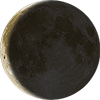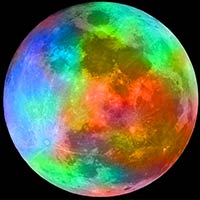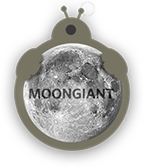
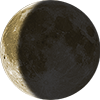 February 13 Waning Crescent 26% |
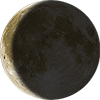 February 14 Waning Crescent 18% |
 Waning Crescent Illumination: 12% |
 February 16 Waning Crescent 6% |
 February 17 Waning Crescent 2% |
Moon Phase: February 15, 1939
On this day the Moon was in a Waning Crescent phase. This phase is best viewed just before the sunrise in the western sky. In this phase the Moon’s illumination is growing smaller each day until the New Moon. During this part of the Moon cycle, the Moon is getting closer to the Sun as viewed from Earth and the night side of the Moon is facing the Earth with only a small edge of the Moon being illuminated. It can also be a great time to see the features of the Moon's surface. Along the edge where the illuminated portion meets the dark side, the craters and mountains cast long shadows making them easier to observe with a telescope or binoculars.
Visit the February 1939 Moon Phases Calendar to see all the daily moon phase for this month.
Waning Crescent Phase
The Waning Crescent on February 15 has an illumination of 12%. This is the percentage of the Moon illuminated by the Sun. The illumination is constantly changing and can vary up to 10% a day. On February 15 the Moon is 26.27 days old. This refers to how many days it has been since the last New Moon. It takes 29.53 days for the Moon to orbit the Earth and go through the lunar cycle of all 8 Moon phases.
Today's Moon Sign: ♊ Gemini
The current zodiac moon sign is Gemini, positioned at 29.15° within the sign. The Moon entered Gemini on Loading... and will shift into Cancer on Loading.... The zodiac moon sign represents the position of the Moon as it moves through the twelve signs of the zodiac. Each zodiac moon sign lasts about 2 to 2.5 days as the Moon travels through that part of the sky.
The 8 Lunar Phases
There are 8 lunar phases the Moon goes through in its 29.53 days lunar cycle. The 4 major Moon phases are Full Moon, New Moon, First Quarter and Last Quarter. Between these major phases, there are 4 minor ones: the Waxing Crescent, Waxing Gibbous, Waning Gibbous and Waning Crescent. For more info on the Moon Cycle and on each phase check out Wikipedia Lunar Phase page.
Phase Details for - February 15
Illumination: 12%
Moon Age: 26.27 days
Moon Angle: 0.49
Moon Distance: 404,178.10 km
Sun Angle: 0.54
Sun Distance: 147,765,166.04 km
Useful Moon Resources
Check the weather before a night of Moon gazing at weather.com
For a list of all the current meteor showers visit American Meteor Society
Waning Crescent Moonrise and Moonset
